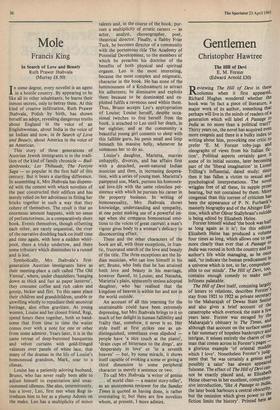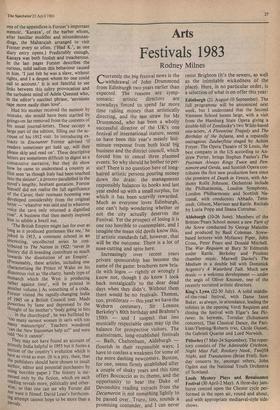Gentlemen
Christopher Hawtree
The Hill of Devi E. M. Forster (Edward Arnold £30) Reviewing The Hill of Devi in these columns when it first appeared, Richard Hughes wondered whether the book was 'in fact a piece of literature, a major work of its author, something that perhaps will live in the minds of readers of a generation which will label A Passage to India as no more than a political tract?' Thirty years on, the novel has acquired even more exegesis and there is a bulky index to writing about him, provoking one critic to prefer 'E. M. Forster toby-jugs and oleographs of views from his Italian fic- tion'. Political aspects certainly gave it some of its initial success, later becoming part of the 'liberal imagination' in Lionel Trilling's influential, dated study; since then it has fallen a victim to sexual and pyschological interpretations. The novel wriggles free of all these, its supple prose bearing, but not contained by them. More congenial than this torrent of criticism has been the appearance of P. N. Furbank's masterly biography and of the Abinger Edi- tion, which after Oliver Stallybrass's suicide is being edited by Elizabeth Heine. Forster himself wished 'the book was half as long again as it is'; for this edition Elizabeth Heine has produced a volume four times as long, which allows one to see more clearly than ever that A Passage to India was rooted in both the country and its author's life while managing, as he on said, `to indicate the human predicament in a universe which is not, so far, comprehen- sible to our minds'. The Hill of Devi, too, contains enough comedy to make such loftiness palatable. The Hill of Devi itself, consisting largely of letters to relations, describes Forsters stay from 1921 to 1922 as private secretary to the Maharajah of Dewas State Senior and also gives a brief account of the catastrophe which overtook the state a few years later. Forster was enraged by the Maharajah's obituary in The Times, and although that account on the surface seals, a fair summary of hopeless bankruptcy an intrigue, it misses entirely the charm of the man that comes across in Forster's pages a glorious example `of oriental muddle which I love'. Nonetheless Forster's judg: ment that 'he was certainly a genius an_4° possibly a saint° has always appear' fulsome. The effect of The Hill of Devi can- not be exactly placed and, as Elizabeth Heine observes in her excellent, comprehen- sive introduction, 'like A Passage to India, the later book harbours a central obscuritY, but the omission which gives power to the fiction limits the history'. Printed here as
one of the appendices is Forster's important memoir, 'Kanaya', of the barber whom, after familiar muddles and misunderstan- dings, the Maharajah arranged to visit Forster every so often. ('Had K.', as one diary entry opens.) Predictably enough, Kanaya was both foolish and treacherous. In the last pages Forster describes the curious, mild sadism this behaviour caused in him. 'I just felt he was a slave, without rights, and I a despot whom no one could call to account.' It is not fanciful to see links between this sultry provocation and the turbulent mind of Adela Quested who, in the editor's succinct phrase, 'envisions rape more easily than love'.
Had his mother received the memoir by mistake, she would have been startled by goings-on far removed from the contents of his usual journal-letters. These occupy a large part of the edition, filling out the ac- count of his 1912 visit. In introducing ex- tracts in Encounter Forster advised `if readers sometimes get held up, will they Please skip and read on'. These descriptive letters are sometimes difficult to digest as a consecutive narrative, but they do show how he came to understand a country at first seen 'as though Italy had been touched into the sinister', a process parallelled in the novel's lengthy, hesitant gestation. Forster himself did not realise the full significance of the Caves; their resonant booming was developed considerably from the original letter — 'whatever was said and in whatever voice the cave only returned a dignified roar'. A business that then merely inspired him to nibble a brazil nut.
`The British Empire might last for ever as long as it produced gentlemen like me,' he Joked in 1913, a comment echoed in an Interesting, uncollected series he con- tributed to The Nation in 1922: 'never in history did ill-breeding contribute so much towards the dissolution of an Empire'. (Presumably, these articles, including one characterising the Prince of Wales on his disastrous visit as 'the chatty, handy type of monarch which the West is producing rather against time', will be printed in another volume.) As something of a coda, Forster visited the rapidly-changing India of 1945 on a British Council tour. Made Powerless by fame and depressed by the thought of his mother's 'body going to bits ; • . in the churchyard', he was buffeted by too many earnest women in saris with too many manuscripts'. Teachers wondered can the New Statesman help us?' and were told 'No it cannot'.
.They may -
not have found an account of
princely India helpful in 1953 but it forms a ,section of the country's evolution which is here as vivid as ever. (It is a pity, then, that the publishers should have chosen to insult author, editor and potential purchasers by using horrible paper.) The history is sur- passed only by the fiction, which on each reading reveals more, politically and other- wise, so that one can see why Forster did not want it filmed. David Lean's forthcom-
ng attempt cannot hope to be more than a Parody.











































 Previous page
Previous page